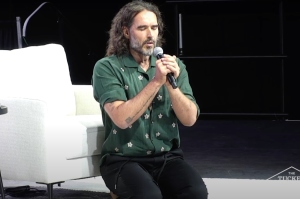Tim Keller: 'If You Live the Way God Wants You to Live in the World, You Will Suffer'
Meagchurch Pastor, Theologian Talks New Book 'Walking With God Through Pain and Suffering'
Now, having said that, the Bible says there are several other things suffering can do for you. And that is, if you are patient under it, one thing it does, it tends to make you more compassionate and helpful to other people. Secondly, it helps you understand your own heart, you get to know your own strengths and weaknesses, you come to understand your own limitations better. Thirdly, you do learn what's important in life. Very often suffering shows you that it was too important to you that you did this and did that, and you rest your heart more in God. Suffering enables you to trust God better and reorder your priorities, enables you to know yourself, it humbles you in a good way and makes you far more compassionate to other people. So it does develop character in you, but that's not the primary purpose of it. It's to glorify God.
CP: In the Walking With God Through Pain and Suffering you also refer to the theme of the "refiner's furnace" in terms of suffering. Please comment on that.
Keller: That's something that the Bible uses...Peter uses that as a metaphor for suffering. What's brilliant about it is the refiner's furnace, of course, is heat, which of course could destroy. But if it's used properly, the heat forges you, strengthens you. When you put metal in there, it can strengthen it, purify it, beautify it. You put gold in there, it gets rid of the impurities. If you put iron in there, you can temper it and make it stronger. … Instead of letting your sorrows destroy you, just make you bitter, make you angry...there's a lot of ways it can destroy you. It can make you proud. I've seen people who've suffered who just get very proud and arrogant because they think 'nobody suffered like me.' In all those cases, the fire you might say, if the suffering is like the fire, the fire is actually burning you up. But if you trust in God, it becomes like a refiner's forge where the fire — it still hurts, it's still hot — but it's strengthening and beautifying you.
CP: You and your family have endured your own moments of grief and you mention that while living through these experiences you once considered quitting pastoral ministry. What is the joy that you've found in experiencing suffering and grief?
Keller: I would not say that my suffering...you know, I'm a 63-year-old man, so I don't think I've had unusual amount of suffering compared to other people. I had thyroid cancer, and that was a scare…and I've survived it so far. My wife had a very very debilitating disease and at one point she was so sick that I thought I would have to leave the pastoral ministry. But she's gotten better, too. These are the sorts of things people go through. None of my children have died, for example, nor has my wife died, and there are plenty of people who get in their 60s who have experienced that, which is much worse than what I've experienced so far. But eventually, we do lose our loved ones. So I would say — this sounds a little strange to say — but I feel like my suffering is rather ordinary and is very ordinary human suffering. Yet, there were times in which during that suffering I turned to God. Sometimes it was just I had to hold on, and I learned just to hold on even though I felt terrible. Occasionally, He gave me particular moments of peace. But that is not a promise. He doesn't promise that if you turn to Him you'll just be fine. But He does promise to be there with you. So I think I've had a very ordinary, not extraordinary, experience with suffering. In other words, I haven't had anything horrendous, really out of the ordinary. Nor have I felt terribly abandoned by God. Nor have I felt that I've gotten these incredible revelations of His peace and rapture either. I've had such an ordinary experience of suffering as a Christian man that it helps me write the book. I feel like I'm sort of in the mainstream at this point. I have not had a charmed life, but I also haven't had a horrendous life.
CP: Speaking to the role of God, the Sovereignty of God who is transcendent but who became incarnate, you speak of Jesus as the "ultimate Job, the only truly innocent sufferer." How do you remind people that God is there in the suffering because he himself has endured it?
Keller: I can do it as a preacher, and I can do it because I try to get to Jesus every time I preach a sermon no matter where I am. If I'm preaching in the Book of Job, I'm not going to end that sermon without talking about how even though Job was a relatively innocent sufferer. He didn't deserve the suffering, the suffering came to him. He was an innocent sufferer. Job's friends accused him of being a terrible sinner. They said, 'If you're having a worse life than us, then you must be a worse person than us.' At the end, God basically condemns Jobs' friends and says, 'No that's not the way it works. Sometimes people have worse lives even though they're good people.' But if you just end the book like that, I don't think it helps because then you just say, 'I already knew that, I already knew that sometimes bad things happen to good people.' That's what the Book of Job is about.
But if you realize that everything in the Bible points to Jesus, so that on the cross you have a perfect example of a person who was totally innocent, not relatively innocent, totally innocent, having a terrible terrible life, then you realize, 'Oh, so sometimes God does let bad things happen to good people and He brings good out of it somehow.' So if you were watching Jesus die on the cross, you might say, 'I don't see how God can bring any good of this.' But of course He did. But if you had walked away and lost your faith because you couldn't understand it, that would have been your fault. I say look at Jesus as the ultimate Job. He's the ultimate Jonah who suffered because he went into the ultimate storm of wrath. He's the ultimate David...he's the ultimate example of all the sufferers of the Bible. When you look at how he suffered, that sheds light on my suffering. I try to get there, that's how I try to do it every time I preach.
CP: Joni Eareckson Tada wrote in her review of of Walking With God Through Pain and Suffering that the subject of suffering has "consumed me for the last 46 years of quadriplegia," and that your book may be the most comprehensive contemporary book on the subject." How did you feel about that review?
Keller: I was really humbled by it. I really was. Because, see there's a person who's had her end of suffering. I've had thyroid cancer and I survived. My wife had Crohn's disease which she survived. I can walk about, she's been in a wheelchair, she's a quadriplegic. She's the same age as we are, so she spent 40 years or more reading books on suffering and writing books on suffering. For her to say this is the most comprehensive single book on it and I want to give it to all my friends, it was just a huge honor. It's an honor. It made me feel that if she thinks there's something in it, then I guess it'll help people. Honestly, I said, 'If she likes it, then it'll probably help people.'
More information on Walking With God Through Pain and Suffering can be found online at http://timothykeller.com.


























